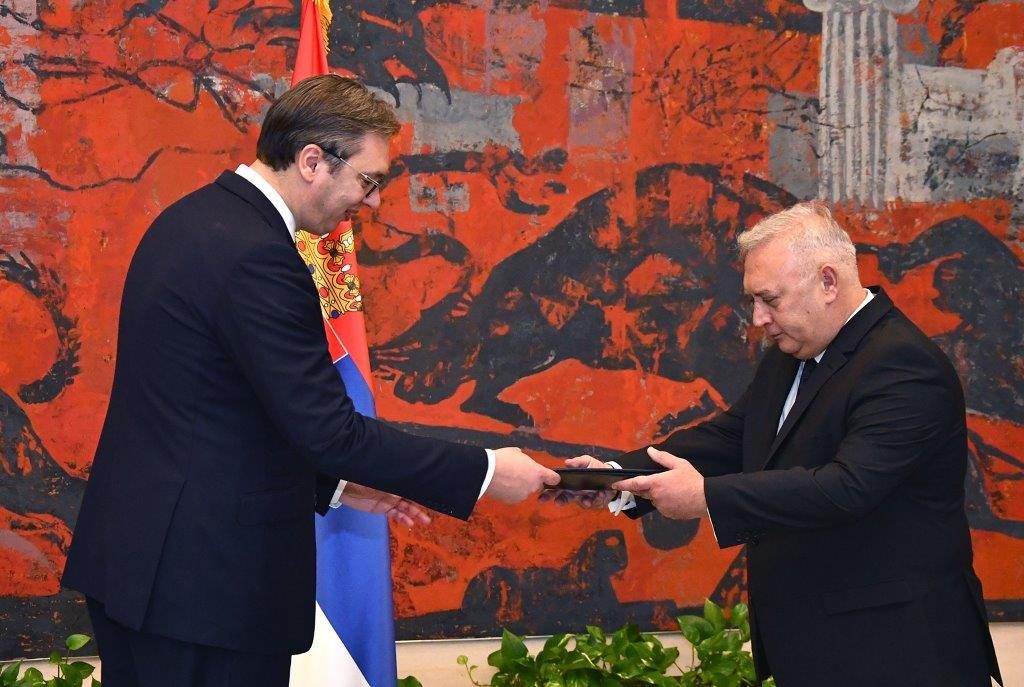Zero problems but plenty of room for expanding and deepening of our multilevel cooperation is exactly the core of our bilateral relations
We spoke with H.E. Georgios Diacofotakis, Greece Ambassador to Serbia about economic and bilateral relations between our two countries, battling the coronavirus pandemic and his views about boosting our cooperation. This is my second term in Belgrade. I served as Deputy Head of Mission here between 2000 and 2004. I am very happy that I returned to Serbia as Ambassador after 15 years. I like very much the country and its people. This is an opportunity to express my sincere thanks to the Government and the people of Serbia for their hospitality and kindness. I really feel at home.

What are your impressions of Serbia’s cooperation with Greece?
Our countries have traditionally been very close. We fought together, on the same side, in two Balkan and two World Wars. We shed our blood together for freedom and against oppression and tyranny. Nowadays, cooperation is expanding in all fields. As you may remember, in December last year, President Vucic travelled to Athens where he signed the Declaration on the Strategic Partnership between our countries. This is a very important document highlighting not only the excellent state of bilateral relations but also the potential to expand them in all fields; especially in trade and new technologies, which provide for new opportunities.
Greece has managed to slow down the spread of COVID-19 thanks to strict measures. What is the situation today?
Thanks to early and severe containment measures, Greece has successfully managed to flatten the curve very quickly and slow down the spread of the virus. We suspended public events and closed down schools even before the first 90 cases were detected. On June 1, we reopened gradually and under restrictions our borders for the summer period.
“Greece welcomes the progress that has been made so far in Serbia’s negotiations with the EU”
Unfortunately, the second wave of the virus occurred and the European continent seems to be affected the most. Today, Greece is in a much better epidemiological situation than many other countries thanks to the individual responsibility of the vast majority of the Greek people.
However, we are fully aware that the current picture may change at any moment. Therefore we remain vigilant and the government successfully continues with its plan to strengthen the Health System, with the recruitment of medical staff and the increase of the number of ICU beds.
How much did the Greek economy suffer because of the coronavirus’ impact on the tourism industry?
As governments began to take measures in order to protect the health and safety of their citizens, such as travel bans and restrictions in the free movement of people between countries, it was evident that the tourist industry would be enormously affected by the crisis. Let me give you some figures: Tourism is a key pillar of the Greek economy, directly accounting for a 11.7% of the country’s GDP, while its indirect contribution to it is estimated between 25.7% up to 30.9%. Taking into consideration that 90% of tourism comes from abroad, it is safe to assume that the country could suffer a significant blow from the global impact of the pandemic.
Athens International Airport marked an average 70% decline between March and August this year, compared to the same period in 2019. According to data presented by the Minister of Tourism, the revenues for July amounted to 577 million Euros, down by 84.4%. Revenues in August reached 1.6 billion Euros, down by about 60%. According to the latest data, a total of 3.9 million visitors mainly from Europe have traveled to Greece so far this year, equal to 22% of arrivals in the same period last year. In sum, tourism-related revenues are expected to reach 20% of the 2019 total by the end of 2020.

On a positive note, Greek tourism achieved three very important goals this year: First, the tourism market gave Greece a vote of confidence. Secondly, the country’s brand name and good reputation formed during the first wave of the pandemic was not only maintained but strengthened during the tourist season. Thirdly, the implementation of health protocols was exemplary. Of course, there are many lessons learned, so our goal for the post-pandemic future is to focus on sustainable tourism.
Greece traditionally supports Serbia on its path to the EU membership. What should be the priorities of the new Serbian government?
Integrating all WB countries to the EU is a long-term strategic objective of Greek foreign policy. The 2003 Thessaloniki Agenda for the Western Balkans, adopted during the Hellenic Presidency of the European Council, paved the way for these countries to join the European family. Almost 20 years later, in February this year, the Foreign Affairs Ministers of Greece, neighbouring EU states and WB countries, along with EU officials attended the Thessaloniki High Level Conference on the European Perspective of the Western Balkans “From Thessaloniki to Zagreb” and reaffirmed that the future of our entire region lies within the EU.
Greece has always been a staunch supporter of Serbia’s European integration. Let me remind you that the EU-Serbia accession negotiations began during the 2014 Hellenic Presidency of the Council of the EU. We welcome the progress that has been made so far in Serbia’s negotiations with the EU and we are convinced that the country’s dedication to European integration will remain a top priority of the new government as well.
I have actually had the opportunity to discuss these issues during my recent meeting with Minister Jadranka Joksimović, to whom I reiterated Greece’s firm support to Serbia’s EU accession bid and its willingness to provide any practical assistance if needed.
How would you assess the overall relations between Greece and Serbia? In an interview, during his visit to Serbia, in November 2019, Foreign Affairs Minister, Nikos Dendias when asked to comment on the Greek-Serbian relations, he replied, inter alia, “Talking today with Foreign Minister Dačić and with President Vučić, we had no differences to solve. We discussed the past and we discussed the future but there is no difference between us. There is always an understanding and also an effort to see how we can establish our common future”. I believe that this is exactly the core of our bilateral relations, zero problems but plenty of room for expanding and deepening of our multilevel cooperation.
In which areas can the two countries improve their relations and exchange knowledge and experiences?
The signing of the Joint Declaration establishing a Strategic Partnership between Greece and Serbia – in the context of the 3rd High-Level Cooperation Council (HCC), which took place in Athens on 11 December 2019 – has upgraded and enriched our bilateral cooperation.
“We discussed the past and we discussed the future but there is no difference between us”
The Declaration covers six areas, including defence, security, civil protection, economy/connectivity, renewable energy sources, culture, education, sports, health, environment and support for Serbia’s efforts to join the European Union.
Last but not least, Greece and Serbia seek to expand their cooperation through multilateral schemes, such as the Greece – Bulgaria – Romania – Serbia Quadrilateral Cooperation Mechanism, which was launched on Greece’s initiative aiming at promoting security, stability and growth.
What is your view of the challenges we face once the pandemic passes and migrants become the number one topic again?
The Greek government is currently developing the National Migration Strategy 2020-21 with measurable objectives: the substantial restriction of flows and the drastic reduction of the impact on local communities, both on the islands and on the mainland. By implementing a strict but fair migration policy, Greece respects international law and European values and at the same time aims at avoiding to be a getaway for migrants.
Among the important policy changes that have already taken place in the management of the migration problem, I could mention the reduction of the flows by 73% this year, the acceleration of asylum procedures, the positive balance of departures /arrivals and a new legal framework for controlling the operation and economic activity of the NGOs.
Travelling to Greece
When will Serbian citizens be able to go to our favourite destination?
Since the beginning of the crisis, we tried to strike a fair balance between public health and the opening of our borders to foreign tourists. The government has been working intensively in order to adapt to new normality and is currently developing a comprehensive plan for the next summer. In the meantime, let me bring to your knowledge that Greece has ratified in September the bilateral agreement on tourism. This agreement lays down the groundwork for expanding our cooperation in this field.